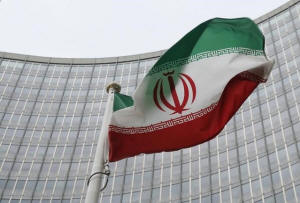|
A year later, U.S. lawmakers still take
aim at Iran nuclear deal
 Send a link to a friend
Send a link to a friend
 [July 12, 2016]
By Patricia Zengerle [July 12, 2016]
By Patricia Zengerle
WASHINGTON (Reuters) - U.S. lawmakers this
week will consider three Republican-backed measures targeting the Obama
administration's nuclear agreement with Iran, which bitterly divides
Washington a year after it was announced and could play a role in
November's elections.
One bill would impose new sanctions on Iran over any sponsorship of
terrorism or human rights violations. Another would bar the purchase
from Iran of "heavy water," a non-radioactive byproduct from making
nuclear weapons and nuclear energy. The third would block Iran's access
to the U.S. financial system, including the use of the dollar.
Republican lawmakers, who control the House of Representatives and
Senate and unanimously opposed the nuclear deal announced last July 14,
have said the measures are necessary to send Iran a strong message that
it will face consequences if it violates international agreements.
Many, joined by several Democrats, have been especially concerned by
Iran's actions since the deal was officially implemented in January,
including its test-firing of ballistic missiles in March.
"It makes sense to do all we can to check this very dangerous Iranian
activity," Republican Representative Ed Royce, the chairman of the House
Foreign Affairs Committee, told the Rules Committee, which sets up rules
for debate of bills headed to the House floor.

Thanks in part to the nuclear agreement, Iran has begun to rejoin global
politics and economics after more than three decades of isolation.
Business and political leaders are visiting the country, which is also
hosting trade conferences.
In his first report on the deal, United Nations Secretary-General Ban
Ki-moon said Iran's ballistic missile launches "are not consistent with
the constructive spirit" of the nuclear deal. He said it was up to the
U.N. Security Council to decide if the launches violated the resolution
backing the agreement.
However, he also said he was "encouraged by Iran's implementation of its
nuclear commitments."
Republicans worry that President Barack Obama is so eager to preserve
the pact as a legacy that his administration will give Tehran too much
leeway before he leaves office in January.
ELECTION-YEAR POLITICS?
Former Secretary of State Hillary Clinton, the presumptive Democratic
presidential nominee, backs the nuclear deal. Republican candidate
Donald Trump has promised to tear it up if he is elected on Nov. 8.
Most of Obama's fellow Democrats in Congress backed the agreement. They
say the new legislation is intended to undermine or even derail it.
[to top of second column] |

An Iranian flag flutters in front of the International Atomic Energy
Agency (IAEA) headquarters in Vienna, Austria, January 15, 2016.
REUTERS/Leonhard Foeger

The White House issued a threat on Monday to veto all three bills,
saying they would affect the continued viability of the nuclear
agreement.
The deal "is critical to ensuring that Iran's nuclear program is and
will remain exclusively peaceful, which is profoundly in the
national security interest of the United States and the
international community," it said in a statement.
The bills are not expected to win enough votes to advance in the
Senate, even if they pass the House. And if they did pass the
Senate, they would lack enough support to override a veto.
Backers of the Iran deal said Republicans were trying to appeal to
voters just days before the convention where Trump is due to become
the party's presidential nominee.
Polls show an overwhelming majority of Americans have an unfavorable
view of Iran.
Dylan Williams, vice president for government affairs at J Street, a
pro-Israel group that supported the nuclear deal, said such
legislation plays into voters' frustration with what they see as a
do-nothing Congress.
"This kind of grandstanding not only endangers our security by
endangering the deal, it's exactly the type of politics that people
are sick of," he said.
(Reporting by Patricia Zengerle; additional reporting by Michelle
Nichols at the UNITED NATIONS; editing by David Gregorio)
[© 2016 Thomson Reuters. All rights
reserved.]
Copyright 2016 Reuters. All rights reserved. This material may not be published,
broadcast, rewritten or redistributed.

 |